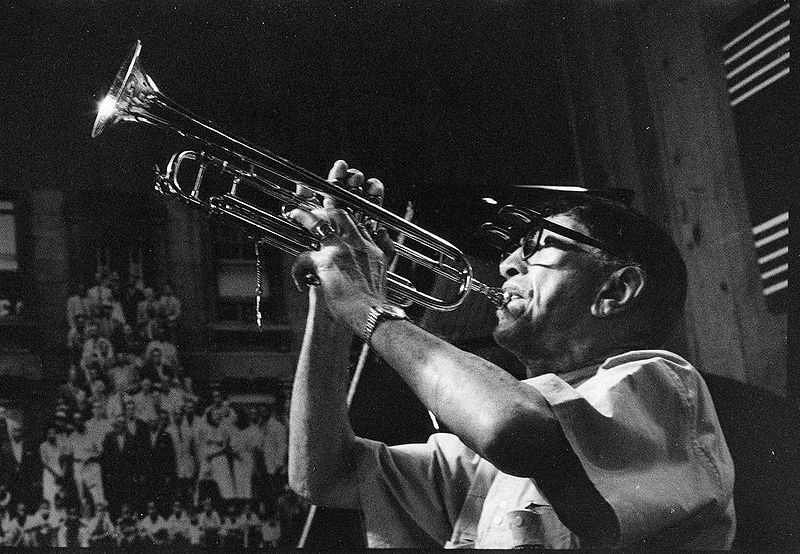
Doc Cheatham, photographed during one of his legendary jazz brunches, (Sweet Basil's in Greenwich Village, New York City) in front of Art Kane's famous photo. Photo by Ed Newman. Used by permission.
Adolphus ‘Doc’ Cheatham was a walking encyclopedia of jazz history. He rubbed shoulders in Chicago with King Oliver and Jelly Roll Morton. He played behind blues queens Ma Rainey and Bessie Smith and toured with Cab Calloway. Then, at the age of 60, he joined the Benny Goodman Orchestra and his talent really began to blossom. Never out of work, he kept on recording and performing for three more decades. Doc Cheatham joined The Jim Cullum Jazz Band at The Landing when he was 85 years old and at the height of his power as a trumpeter.
LISTEN: Doc Cheatham sits in for Louis Armstrong
Jim Cullum says, “Doc was full of stories and lore from the early jazz days. He had known Louis and Lil Armstrong during his first visits to Chicago in the mid-1920s. Lil Hardin Armstrong helped Doc get accepted into the musicians’ union in Chicago. No one was more colorful or more fun. His playing got better in his old age.”
On our radio program, Doc plays tunes associated with the various phases of his long career, and he sings two of them with great affection: "I've Got the World on a String" and Don Redman's "Gee, Baby, Ain't I Good to You."
Adolphus Anthony Cheatham was born in Nashville in 1905 from a lineage that included African American slaves and Cherokee and Choctaw Indians. His nickname ‘Doc’ came from his family's wish for him to become a pharmacist. After touring in the South, backing blues singers, he found his way to Chicago, where he came under the influence of King Oliver and Louis Armstrong. He frequently subbed for Louis Armstrong at the Vendome Theater when the young trumpet player’s star was rising. Audiences would thrill to Louis’ spectacular solo on “I Can’t Give You Anything But Love” as he stood to play it from the orchestra pit. Doc recalled the groans he’d hear from the audience when he played the opening notes and they realized the man behind the horn was Cheatham and not Armstrong. In 1932 Cab Calloway hired Doc to play lead trumpet in his band, where he worked until 1939.
On our radio show, Doc recalls what it was like to be on the road with Cab Calloway at the top of his game. Touring in the South in the late 1930s, the Calloway Orchestra put on a spectacle, performing in huge makeshift venues like dusty tobacco barns for thousands of jazz fans, dancing late into the night. Many times the band was paid in cash collected from patrons and distributed among the musicians on board the train after the engagement. After one gig, there was so much cash it took all night to count it. In the confusion, Doc was paid twice, by mistake. Many years later, when both men were in their 80s, Doc confessed to Cab that he didn’t speak up that hectic night when he was handed a pay packet for the second time. Cab told him, "I hope you're gonna pay me the interest you owe me!"
In radio interviews with David Holt and Jim Cullum, Doc recounts stories from his days with Benny Goodman in the 1960s, and of his later total re-assessment of his own jazz playing in the 1970s. Doc’s playing steadily improved and he became busier than ever, touring widely and appearing at jazz festivals and parties worldwide. In 1996, Doc became friends with the young New Orleans trumpeter Nicholas Payton, and they collaborated on a Verve CD, Doc Cheatham and Nicholas Payton, which won a Grammy Award.
Doc Cheatham seemed to never forget a face. People, who knew Doc only slightly and might not see him for years, would be surprised when he picked them out of a crowd on a Manhattan sidewalk, and called them by name. Doc continued to perform regularly until a few days before his death in 1997 at the age of 91.
Photo credit for Home Page teaser image: Doc Cheatham photo courtesy Riverwalk Jazz.
Text based on Riverwalk Jazz script by Margaret Moos Pick ©2012

